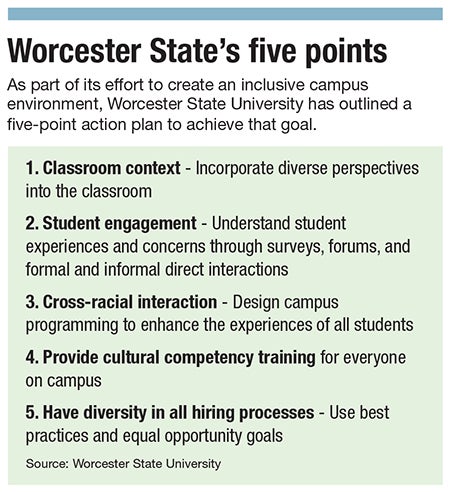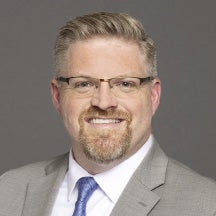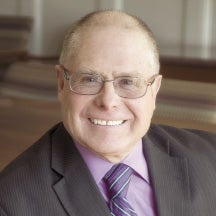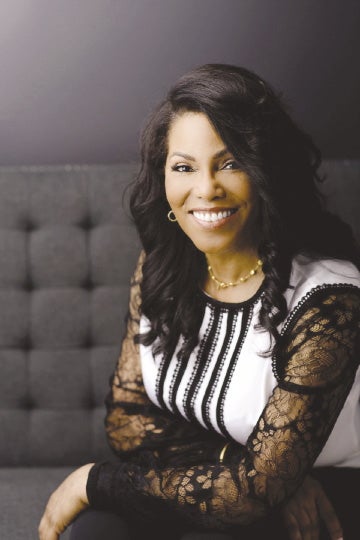Halfway through her tenure as the university’s inaugural DEI fellow, Ilyasah Shabazz is helping Worcester State work to sustain an inclusive and welcoming environment
Get Instant Access to This Article
Subscribe to Worcester Business Journal and get immediate access to all of our subscriber-only content and much more.
- Critical Central Massachusetts business news updated daily.
- Immediate access to all subscriber-only content on our website.
- Bi-weekly print or digital editions of our award-winning publication.
- Special bonus issues like the WBJ Book of Lists.
- Exclusive ticket prize draws for our in-person events.
Click here to purchase a paywall bypass link for this article.
In September, Ilyasah Shabazz started her tenure as Worcester State University’s inaugural DEI fellow for this academic year. Her mission? To support diversity and inclusion efforts as well as develop recommendations for the Office of Diversity, Inclusion, and Equal Opportunity.
Her appointment to the milestone position came mere months after the U.S. Supreme Court in June ruled against colleges and universities using affirmative action in their admissions policies to improve the racial diversity of their student population. It’s an interesting time to be involved in higher-education diversity, even more so for Shabazz, the daughter of late civil rights icons Malcolm X and Betty Shabazz.
“Given all that we have accomplished as a civilized, forward-thinking nation – particularly after surviving a pandemic, where we confronted our own mortality and common humanity – that this was the decision made by our Supreme Court?” Shabazz said in an email interview with WBJ.
It’s the bigger perspective that should resonate, she said.
In regard to states like North and South Carolina, which are tracking DEI program spending, Shabazz said surveillance and intimidation are close cousins.
“My father knew that very well – as did Dr. Martin Luther King, Jr. – tracking is merely a nice way of saying they are looking for any reason to discredit those doing good work. But my father did not allow the fact that he was being surveilled [to] silence his voice,” she said. “He understood the bigger picture.”
Detrimental outlook
“As a university, we prosper when we affirm the value of every student,” said Shabazz.

This premise from economic and social policy expert Heather McGhee’s book “The Sum of Us: What Racism Costs Everyone and How We Can Prosper Together” guides Shabazz’s work at the university level.
She reiterates McGhee’s main message: That university systems where it is now unlawful to consider race a basis for admissions comes at a price to our society as a whole.
“In the book, McGhee writes, ‘Color blindness has become a powerful weapon against progress for people of color, but as a denial mindset, it doesn’t do white people any favors, either,’ said Shabazz. “McGhee writes, ‘A person who avoids the realities of racism doesn’t build the crucial muscles for navigating cross-cultural tensions ... Denial leaves people ill-prepared to function or thrive in a diverse society. It makes people less effective at collaborating with colleagues, coaching kids’ sports teams, advocating for their neighborhoods, even chatting with acquaintances at social events.’”
Since arriving on campus, Shabazz has participated in Worcester State University’s Unity Day, which showcases the differences in members of the campus community and offers opportunities for reflection. Started in 2021, the event’s goal is to foster dialogue around social justice, inclusion and equity.
“We celebrated in the forms of art, music, movement, spoken expression, food, culture, and meditation,” said Shabazz.
Shabazz, who is also a WSU history and political science professor, said she is most impactful when she is able to inspire staff and students to appreciate the challenges of unity and deepen shared humanity. That fundamental bond is most effective.
“I also had the opportunity to present on the topic of intersectionality [overlapping forms of discrimination, such as racism and classism] in STEM to the National Science Foundation Alliances for Graduate Education and the Professoriate faculty fellows,” said Shabazz.
Shabazz introduced to campus a three-part book club series called “The Awakening of Malcolm X” – a book about her father’s adolescence – at a reading with 60 attendees.
Building on momentum
Worcester State welcomed its most diverse incoming student class this past fall semester, with 44% transfer and first-year students identifying as African, Latino, Asian, Native American, and/or Black, Indigenous or People of Color (ALANA/BIPOC). Half of those students are the first in their families to attend college.
“It was much higher than any other year. It’s also attributable to WSU being welcoming and inclusive,” said Ryan Forsythe, WSU vice president for enrollment.

Forsythe credited the growth in ALANA/BIPOC students to changing demographics in the state, as well as the university’s efforts through the Office of Multicultural Affairs, among other factors.
“Worcester State serves students who are more and more diverse. We no longer insist students be college ready but we do have to have our college be student ready, and meet them where they are,” he said.
Shabazz said many top universities conduct climate assessment surveys to assess how staff and faculty are experiencing life on campus as a minorities, in terms of pay gaps, promotion opportunities and the like.
Shabazz cites the example of The University of Rhode Island, which engaged with a national consulting firm for its institutional climate assessments to survey faculty, staff and students during spring 2021, which set the groundwork for future planning.

Those plans include URI diversity initiatives.
University of Rhode Island President Marc Parlange in August 2021 began a campus-wide strategic planning initiative to create a inclusive people-first culture.
“URI will continue to advance the goal to cultivate a sense of community – one university – where all students, faculty, and staff find themselves included and their work valued,” said Dave Lavallee, URI assistant director of communications.

